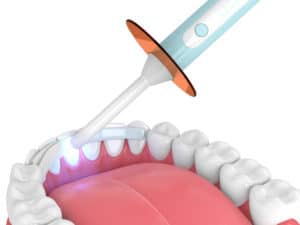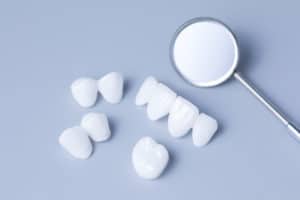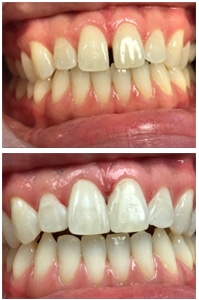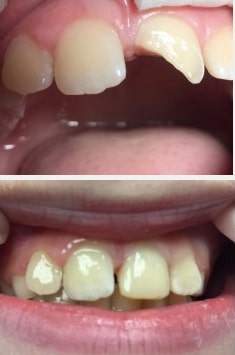What Is Dental Bonding?
In Edison, Metuchen, & South Plainfield, NJ there are now alternatives to standard dental methods that are less invasive and yet as effective as the traditional ones including dental bonding. Dental bonding, sometimes referred to as composite bonding and dental bonding, is one of the easiest procedures and it is the least invasive. Tooth bonding is a restorative procedure that involves applying a resin material to your tooth and securing it in position by using a special light that permanently bonds the resin material.
The resin is very similar to your tooth composition and restores the tooth to its original appearance and can sometimes make it look even better than before. Bonding is more preferred by patients since this can be applied and finished with just one visit and there is no need to remove or damage that much tooth structure, plus the patient doesn’t have to be without teeth since this procedure does not require the appliance to be sent to the dental laboratory.
Dental Bonding Benefits
What’s making dental bonding very popular among patients in Edison NJ is the fact that it is not as invasive as the other procedures. The result is very natural since it uses resin, which can be manipulated to replicate the appearance of the tooth. The procedure is simple and does not require the patient to come back to have it installed, one visit is enough to see the immediate results.
Dental Bonding Before & After
Who Is A Good Candidate For Dental Bonding?
No one has perfect teeth. We may have a small chip here or a gap there. A couple of teeth could have deep staining from a reaction to tetracycline as a kid. Could you benefit from some bonding at our Edison offices? Probably. Bonding doesn’t solve underlying problems, but it is very versatile in masking cosmetic problems. Still, there are circumstances where a better solution could be a crown or maybe porcelain veneers. Dr. Strober, Dr. Messer, or Dr. Butkofski will discuss your options with you.
Dental Bonding Procedure
This procedure does not require as much preparation as other restorative procedures like crowns or veneers. This procedure will last for about 30-60 minutes. The dentist will first pick a resin color that best matches the patient’s tooth color. Once this is done, the dentist will prepare the tooth for bonding by roughening up the tooth surface and will then apply a conditioning liquid. The resin is placed on the tooth and molded to blend into the tooth structure. A laser or ultraviolet light is then applied to harden the resin, after which the dentist will polish the dental bond to attain the appearance of a natural tooth surface.

How Many Sessions Does Dental Bonding Require?
One reason our patients from Edison and the surrounding areas love bonding for simple cosmetic improvements is that it can be done in a single appointment. Let’s say you just chipped the corner of a tooth when biting into an unforeseen item in a sandwich. You can make an appointment and one of our three Gentle Dental dentists can make the tooth whole again in just a single appointment that takes just 30-60 minutes. How easy is that?
Why Should I Consider Getting Dental Bonding?
Dental bonding is usually recommended to repair decayed, scratched chipped, or even cracked teeth. For those who are having a problem with their gums receding, dental bonding can be used to protect the exposed tooth root. This can also be a solution for improving the appearance of badly discolored teeth. Some dentists also use dental bonding as a substitute for amalgam fillings. Dentists also recommend this procedure to those who have a problem with gaps in between their teeth or someone who wants to change the contour of their teeth to improve their appearance. Some dentists also use dental bonding as a substitute for amalgam fillings.
What Is The Difference Between Dental Bonding And Placing Porcelain Veneers?
While both dental bonding and the application of porcelain veneers have the same end goal — to cover cosmetic imperfections and create a perfect smile — they do it in different ways. Bonding uses a composite resin that is sculpted on the teeth, cured, and then polished. To prepare the teeth for bonding, your Gentle Dental dentist will slightly rough up the enamel for better adherence to the resin.

Veneers are thin porcelain shells that are cemented onto the fronts of the teeth. To make room for the veneers, approximately 0.3 mm to 0.5 mm of the tooth enamel must be shaved off. By removing this enamel, these teeth will always have to be covered with veneers (or a crown) in the future.
In use, porcelain veneers do not stain and are quite durable. The resin used in bonding is more resistant to staining than natural tooth enamel, but it can stain over time. Veneers last longer but are more expensive than bonding. Also, bonding is usually done in a single appointment, while veneers require two appointments.
Can Bonding Be Used To Address All Issues With My Teeth?
No. These are purely cosmetic treatments of your teeth. Bonding simply covers up imperfections with your teeth. Bonding is great for covering stains, chips, small cracks, and even small gaps. But these are just aesthetics. Your teeth must be inherently healthy before we can place any bonding resin on them.
If you have dental problems such as tooth decay, a deep crack, gum disease, and other issues, those need to be addressed first before you could have dental bonding.
See What Our Patients Are Saying!
“Dear Dr. Strober– I just wanted to thank you for all your hard work and kindness in taking care of my teeth. My new bonding looks great- I love it- so sincere thanks! Also- you have the most wonderful staff. I don’t know how you managed to surround yourself with so many great people- but well done! See you next cleaning.” – Melissa A. 10-28-04
How Do I Care For My Teeth That Have Had Bonding?
Teeth that have been bonded with composite resin don’t need any special care. Simply follow your typical good home hygiene practices of brushing for two minutes twice a day and flossing once a day. And be sure to keep your twice-yearly professional exams and cleanings with the team at Gentle Dental.
Is Dental Bonding Permanent? If Not, How Long Will It Last?
Dental bonding is not a permanent treatment. How long your bonding treatment lasts depends in part on you. If you practice good hygiene and don’t chew ice and the like, your bonded teeth will continue to look great for up to a decade. Over time, the resin in bonding can chip. This is especially true if you place pressure on those teeth by doing things such as biting your fingernails. At some point, you’ll need to have your bonded tooth or teeth touched up.

Are There Risks To A Dental Bonding Procedure?
The resin used in dental bonding procedures is not as durable as the other restorative procedures, and the bond can chip and break.
Is Dental Bonding Painful?
There is no pain whatsoever with dental bonding.
Schedule Your Dental Bonding Consultation Today!
Want to read more on dental bonding and our other offered services? Visit Gentle Dental Care’s blog! Contact us by calling 732.549.5660 or by submitting the email contact form below to schedule your appointment. Our practice serves Edison, Piscataway Township, New Brunswick, Metuchen, or Woodbridge Township, NJ.





